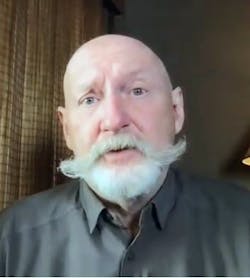Motivational speaker, author and business coach Larry Winget pulls no punches. That’s why he’s known as The Pitbull of Personal Development®.
Mr. Winget's intensity became clear during his presentation for the Electric and Gas Industries Association (EGIA) LEAD2021 virtual conference, presented in early March.
His presentation, “The Practical Application of Success,” was a convicting look at how success works in the real world, with a strong emphasis on the power of words and actions. Because communication is an essential part of a business operation, especially how service personnel communicate to customers. That’s where trust — the most important ingredient — begins.
“Are we communicating in a way that will build trust? Not by saying we’re a nickel cheaper or have the same features and benefits [as a competitor’s products]. Those are the conversations you need to be having with your employees and with yourself,” Winget exclaimed.
The first step in reducing your need for communications training is to hire the right employees, people who are natural communicators and trust buildings. Unfortunately, HVAC businesses are having a tough time attracting them.
The first step in reducing your need for communications training is to hire the right employees, people who are natural communicators and trust builders. Unfortunately, HVAC businesses are still having a tough time attracting quality people. And so there you are: you don’t have time to train because business is good, they’re still untrained, and you’re stuck with them, because it’s hard to get rid of a failing employee, and impossible to make a bad employee much better than they are, Winget stressed.
An employer will often take on a mission to “fix” a bad employee. “You tell them, ‘Do these things. If you do these things you get to keep your job. If you don’t do these things, I’ll have to let you go.’ And the bad employee’s behavior will change, but not for long. We can’t change behavior if that’s not who they are.”
The Non-conformist Among You
Winget said the non-conformist can be found in every business, and sadly, they live for non-conformity.
“Problem employees, are the way they are because they want to be that way. How ugly is that? They don’t want it to be any better,” he insisted. “There’s not a person who works for you that doesn’t know what to do. If any employee doesn’t know what to do, teach them. And then once they know what to do, they aught to be good with that.”
'Problem employees, are the way they are because they want to be that way. How ugly is that? They don’t want it to be any better.' - Larry Winget
Winget said owners and managers sanction bad behavior all too frequently.
“It’s hard to be a great leader of people when the rules don’t apply to everyone and you’re turning your back and tolerating it,” Winget emphasized. “What you tolerate, you endorse. What you put up with, you condone.”
“There are rules you have to establish, such as showing up on time, treating each other with respect, and treating the customer properly, by arriving on time, and treating and speaking to them with respect.”
Here is Larry Winget’s list for high standards of employee behavior:
1. Teach honesty in all you do.
2. Teach respect in all you do.
3. Have respect each other.
4. Respect the competition. You don’t build yourself up by tearing someone down.
5. Respect the customer. This is shown in the way you treat, talk and listen to them.
6. The reason we do what we do is to build trust in the mind of the customer.
7. Insist on integrity always. That means doing the right thing when nobody’s looking.
8. Appreciation.
These will never fail you. These are the values you must establish and reward.
You can read more about Larry Winget HERE.
About the Author
Terry McIver
Content Director - CB
As director of content for Contracting Business, he produces daily content and feature articles for CB's 38,000 print subscribers and many more Internet visitors. He has written hundreds, if not two or three, pieces of news, features and contractor profile articles for CB's audience of quality HVACR contractors. He can also be found covering HVACR industry events or visiting with manufacturers and contractors. He also has significant experience in trade show planning.


